Paul Kent: The Eels need to find a way to keep Clint Gutherson if they are to keep on track
Every NRL club spends the same amount of salary cap, but not every club spends it the same, PAUL KENT writes.
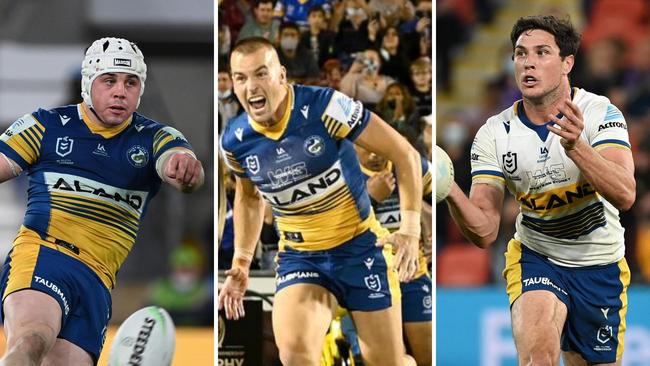
Sport
Don't miss out on the headlines from Sport. Followed categories will be added to My News.
In terms Sydney people understand best, the Parramatta Eels are becoming like those frustrated auction hunters who fall a little short every Saturday on their rounds.
Too often their assessment of market value is a little light so, with that said, and more than a third of the Eels’ squad coming off contract, Parramatta fans were forced to watch Marata Niukore sign with the Warriors last week and then, Thursday, Isaiah Papali’i committing to the Wests Tigers.
Meanwhile, as this happens, speculation spreads like neighbourhood gossip that Reed Mahoney is close to moving to Canterbury
The Eels are in danger of becoming everlasting underbidders, always getting close but with no champagne to pop and, if the trend continues, then Parramatta’s premiership window threatens to close before it is time.
Already season 2023 is beginning to look different to what season 2022 promises.
Watch live coverage of The Autumn Nations Series with beIN SPORTS on Kayo including every Wallabies & All Blacks match. New to Kayo? Start your free trial >
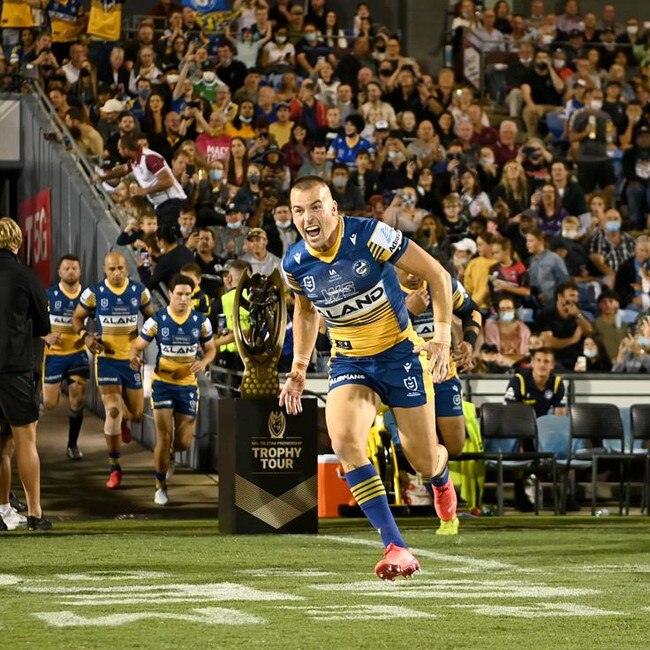
Salary cap management is the dark art of the NRL.
Yet as well educated as the Parramatta recruitment committee is, none of them have a university degree in roster management. It simply does not exist.
It is learned through experience, which is another way of saying trial and error.
There are some basic principles, though, and it is hard not to see the Eels are making elementary mistakes, most notably this long-lasting negotiation with captain Clint Gutherson.
The big problem for the Eels is too many players of similar calibre have become free to negotiate at once, tossing too many balls in the air. The problem it creates is the Eels don’t know exactly what they have to spend in each negotiation because the cap room left changes with every negotiation.
An extra $50,000 offered here then can’t be offered there.
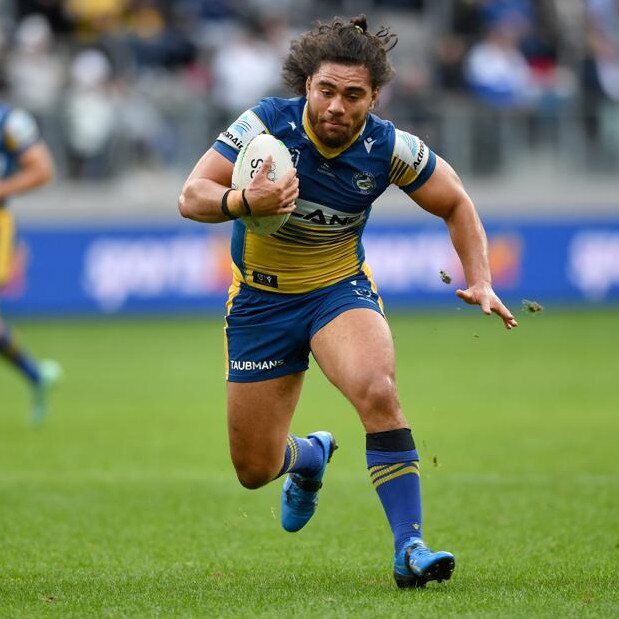
And without a sure eye for player value, negotiations have sputtered.
Adding to complications is that the priorities in Parramatta’s roster is also unclear.
Two solid performers have been lost with only Regan Campbell-Gillard re-signed to balance it.
Meanwhile, Clint Gutherson, Reed Mahoney and Junior Paulo remain unsigned and their pants are getting itchy.
Within hours of Papali’i signature hitting a Wests contract on Thursday Parramatta finally got moving and got on the phone to their agent Sam Ayoub in a bid to fast-track talks.
It is imperative Parramatta sign Gutherson as soon as possible, for a host of reasons.
If the Eels are forced to announce another player is leaving before they announce someone is staying there is no doubt fans will turn up at the football clubs with pitchforks and flaming torches.
Gutherson is essential for many reasons.
He embodies Parramatta. He leads the club, not only on the field but also its culture.
His worth to the club goes beyond what he is paid.
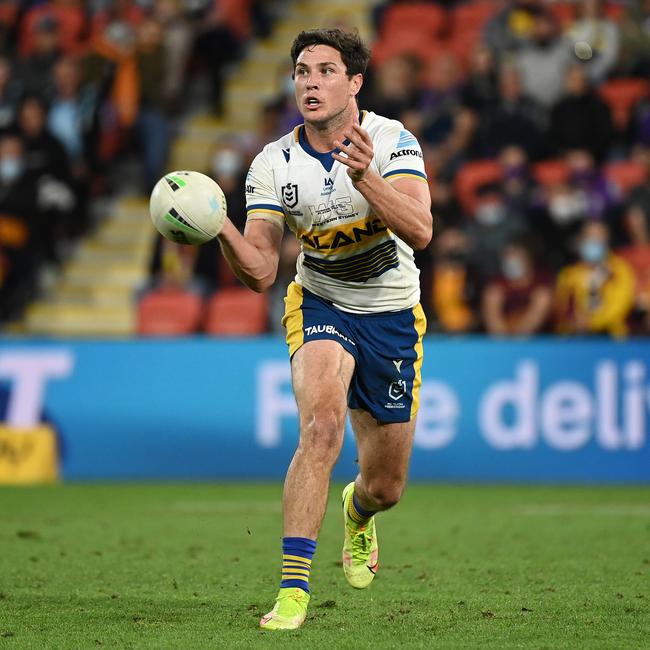
Cap management is not always about meeting market value. Different players offer different value to different clubs.
Parramatta’s spine is the example.
Mitch Moses is employed and paid to be the Eels’ game-breaker and, as the marquee man, to deliver Parramatta its premiership. Dylan Brown is young and developing while Gutherson, at fullback, is the team compass.
He drives the club standards.
Yet all four spine players can’t be on top dollar as it surely weakens the rest of the roster.
Cap management is about needs and wants. The Eels believe they need Moses, so they pay accordingly.
They want Mahoney, but also realise they could generate value across the roster by using a serviceable hooker and spending that money elsewhere in the team.
As for Mahoney, at this stage of his career he deserves the opportunity to cash in on his talents but has found turbulence with the Eels who low-balled him with their original offer.
Now the Eels scramble to play catch up.
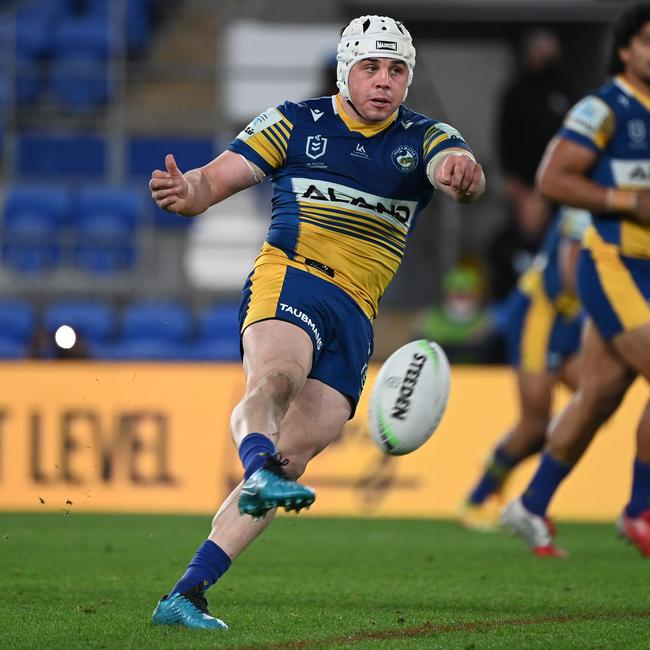
At Canterbury, light on talent, Mahoney shapes more as a need, so the Bulldogs will be prepared to pay him more than Parramatta.
Mix into this that the value of a player adjusts according to the style the coach wants to play and the science of cap management becomes increasingly complex.
Underwriting it all, though, is the trust that the recruitment team knows the proper value of those they are negotiating with.
Melbourne has climbed its way to the top by refusing to pay overs, preferring to see players leave for their cash-in contracts than pay overs to keep them.
The Storm instead point to their lasting success and club culture as a compensation for money.
For such reason Jahrome Hughes knocked back approaches around the NRL to leave Melbourne so he could stay and continue to improve as a player.
Recently, though, his manager has let it be known that Hughes will be going to market at the end of this contract and would be seeking a cash-in contract.
Given his improvement, he deserves all the zeros on it he gets.
It is a discipline not every club can maintain.
Like the housing market, it creates a supply and demand market dictated by market forces and, right now, the market is favouring Gutherson.
His signature says more than they have landed their fullback.
He drives the standards at the Club.
Against this, though, one Parramatta man argued that the Eels spend $9 million-plus in their salary like every other club, so the money is going to someone.
It avoids the one question that provides the surest answer; is it being spent the right way?
* * * * *
Just a month ago International Olympic Committee vice-president John Coates ruled out pressuring China over its human rights record ahead of next year’s Winter Olympics in Beijing.
Coates was speaking at the National Press Club: “The situations that you have referred to _ the humanitarian ones in China _ is not within our remit.”
He said the IOC had “no sovereignty” over nations like China.
While technically right, the and the Olympics have IOC have always been political weapons, from both inside and out, and the IOC has never been shy about it.
It took a new emphases this week when it emerged that Chinese tennis player Peng Shuai has gone missing since she accused a Communist party member of sexual assault on social media last month.
Calls have begun for the IOC to strip next year’s Winter Games from Beijing in protest to Shuai’s treatment.
Like schoolyard bullies, the Olympic movement has a worrying habit of engaging in humanitarian efforts when it suits, like recently helping to evacuate athletes from Afghanistan, but sitting stone cold when the aggressor is a powerhouse like China.
Action against Afghanistan comes without repercussions. China, not so much …
So it has taken the WTA to show the kind of courage the IOC likes to think it has by standing up to China.
WTA chairman and chief executive Steve Simon has threatened to cancel all tournaments in China if verifiable proof of Shuai’s safety is not provided soon.
It is hard to know what the IOC stands for, beyond itself.
BOXING’S COLOURFUL AGE-OLD BATTLE FOR A WINNING EDGE
Some forgiveness for those with a little grey around the temples who committed a double-take this week when it emerged that Japan’s Takeshi Inoue was in town and training at a Bondi gym.
In good news for everybody, and particularly Inoue, it turned out the Japanese fighter has his trainer safely beside him here in Sydney, which is a solid beginning, and not only that but, best of all, the ghosts of promoters past have long been absent from the boxing scene.
In boxing, more than any other sport, there has always been a solid appreciation for a man who knows how to turn a situation to gain a subtle advantage, and even more when it is not so subtle.
The greatest of all happened 98 years ago in Shelby, Montana, a sleepy little American mining town with nothing much to brag about except that it grew rich after an oil strike in 1922.
That being enough, the town leaders wanted the rest of the country to know all about their glorious success so, in a shot of booster spirit, they figured what better way to announce their presence on the national scene than to stage a fight for the heavyweight championship.
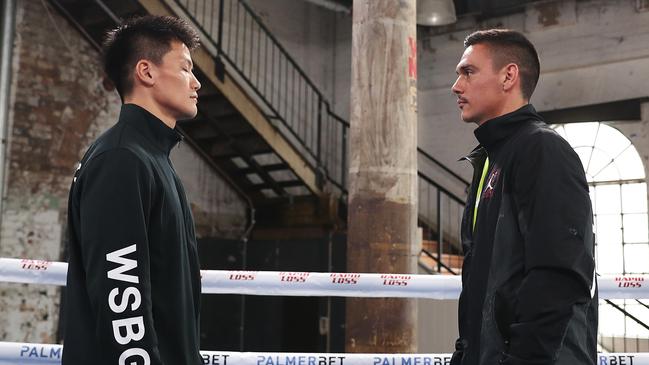
Given Shelby had just a thousand residents, no boxing ring and no major cities within 800km, it was somewhat ambitious, but the oil men had their money …
Jack Dempsey was heavyweight champion so his manager Jack “Doc” Kearns somehow got them to pay Dempsey the first $300,000 from the box office, with everything above that to be split between him and opponent Tommy Gibbons.
Kempsey and Kearns had fled the ring and left town with all that oil money, as well as two bags of silver, in a train caboose, before the town even knew they were gone.
In the days that followed, all four banks closed down, gone broke after the town’s oil men that owned the banks paid their bills, and Shelby was poor again until the next oil strike some years later.
Nothing of that magnitude has ever taken place in Australia, though that hasn’t stopped some from trying.
Bill “Break Even” Mordey was undoubtedly the greatest here.
As the current fight scene goes through a small revival, with Matt Rose and Dean Lonergan Australia’s two foremost promoters, both with deals to promote fights on Fox Sports, the pair have found a small rivalry that is on the slow boil as each tries to outpoint the other with the success of their stables.
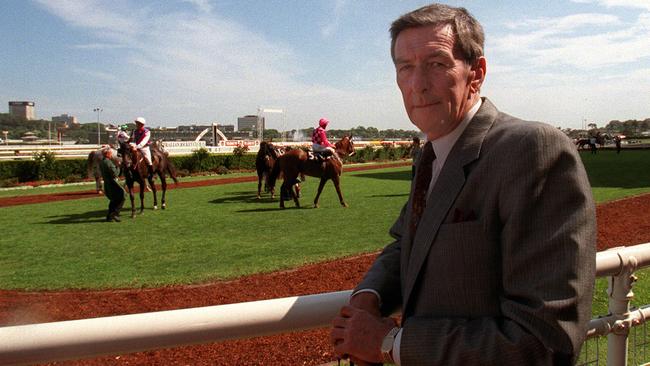
It was thought Rose might have taken a small step forward after bringing Inoue to Australia for Wednesday’s fight at Qudos Bank Arena, against Tim Tszyu, but it must be said that of everything that has happened, it has all been honest and completely above board.
Mordey, with a sharp eye and a slow smile, jumped from the pages of a Runyon short story and immediately figured the odds in boxing were odds worth taking. He found fertile ground.
Before Kostya Tszyu fought Roger Mayweather in Newcastle in 1995, Bill sat in the sports bar at Wests Leagues Club backing slow horses when he took a fancy to some horse, now lost to memory, and sent son Craig to have $200 on it.
It was a small fortune to me at the time. To Bill it was a standard throw on a mid-weeker.
As they were being loaded, a horse broke its gate, sprinting several furlongs before the jockey regained control and turned it around, and Bill’s eyes narrowed to pick the horse’s colours.
He had seen this scene play out too many times before. There was a reason, he knew, he had walked home from every racetrack in Sydney and now, here in Newcastle and just hours before Tszyu would defend his title against Mayweather, the last thing Break Even Bill Mordey figured he needed was for his bad luck to start early.
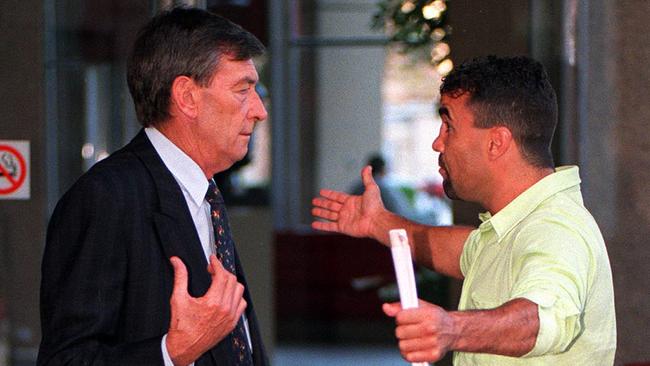
“Quick,” he said to Craig, urgently pushing his TAB ticket into the air, “cancel this ticket.”
Craig jumped and raced to the window but got held up by some each-way punter who couldn’t get on so, sadly, Craig returned to the table after they’d jumped with the live ticket still in his hand.
The horse, somehow, won, which I appreciate goes against type when the usual stories are told about Bill. He then stood and dropped $200 on the table. “Have a drink, I’ve got some work I gotta get done.”
When he was promoting Jeff Fenech’s career early on, Mordey convinced Thailand’s Samart Payakaroon to fly to Australia and risk his WBC super-bantamweight title in what was his biggest gamble yet.
Here was the beginning of the revival of Australian boxing, carried across Fenech’s broad back.
Payakaroon was cocky enough his team privately challenged Mordey to bet the purse, winner take all, not realising that in Bill they found the one man in Australia who would take that bet. And Bill took the bet, knowing he had the tremendous advantage; he had Fenech.
Fenech remains Australia’s greatest fighter. Line them all up, he stands above as our great champion.
Still, it was Bill’s nature, borne from countless losing days at the track, to search for an edge, and with Payakaroon arriving in Australia and his trainer still in Thailand, Bill set him up with Tony Mundine’s former trainer, Charlie Gergen.
“Train him hard,” he told Gergen, who soon had him running the hills of Coogee.
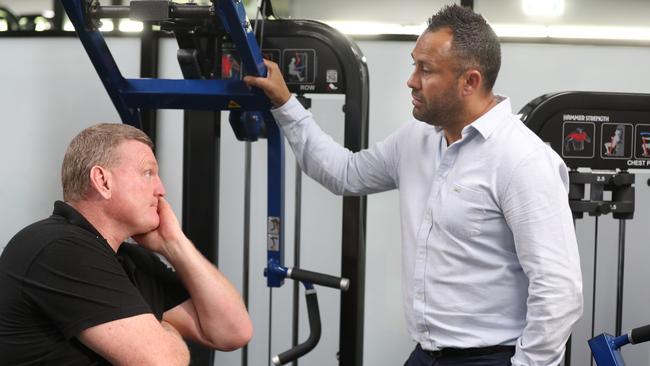
Bill then put Payakaroon up in a city hotel.
“There’s a good little Thai joint near College St where you can go to eat,” he said to him, which is exactly what he did.
Payakaroon found the food worth coming back for, and even more when a young lady eating at a nearby table caught his eye and soon engaged him in conversation.
Before he knew it, Payakaroon was whiling his nights away talking to his new fancy, his heart full, which if nothing else was making for tired mornings when he crawled out of his gloomy hotel bed for roadwork with Gergen.
Payakaroon was considered a future great until he met Fenech, who took him out in four rounds and won Bill his bet.
As for Payakaroon’s new friend, sadly it didn’t last.
It turned out she was not quite there by chance after Bill had found her working in a nearby establishment and, where, Bill quietly revealed some years later, she positively jumped at the chance to earn similar money by the hour for doing little more than keeping a lonely man engaged after a meal.
What they talked about is anybody’s guess, but that was Mordey, looking for an edge even when he didn’t need it, and usually breaking a little better than even.
SHORT SHOT
It is an ugly look all these NRL players using their holidays to shop themselves around to rival clubs, flying across the country for quick-stop chats to find out how much gold they could be offered.
It emerged during the week that Brandon Smith’s manager Stan Martin emailed every other club early on the first day of allowed trading, November 1, early enough so the email was waiting in their inbox for when they logged on.
He was so overt he didn’t even bother inserting the names of those in his correspondence, instead beginning the email, “good morning, gentleman”.
Neither Smith nor Martin are doing anything wrong. And are far from on their own.
It has been said here before that it is impossible for clubs to do a good deal any more; for as soon as a player believes he is on unders, no matter how much long he is contracted for, his manager immediately begins shopping him around for more money.
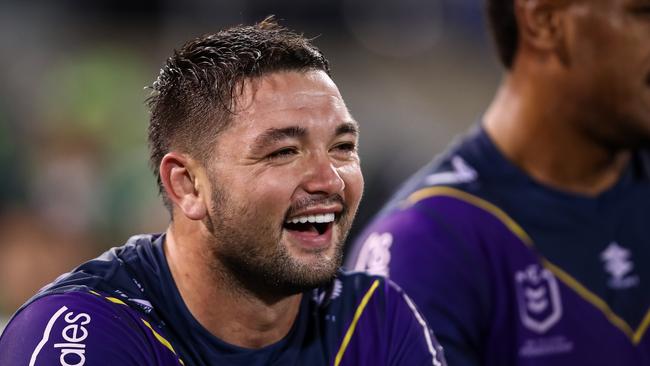
This is why club’s are constantly getting their salary caps out of shape.
Even when they plan well, recruit well, and sign well, players want to go back to the negotiating table for upgrades.
Poor salary cap management is the chief reason why clubs struggle to climb out of the bottom four, or advance their position, why there is such a gulf between the best clubs and the worst clubs … which is why many now believe is why there are so many blowouts during the season.
So, fix one, you might fix the other …
It all would end if the NRL got serious about anti-tampering rules and took guidance from American sports like baseball, where tampering is so treated seriously teams simply do not risk the punishment, instead waiting for legal trade windows.





